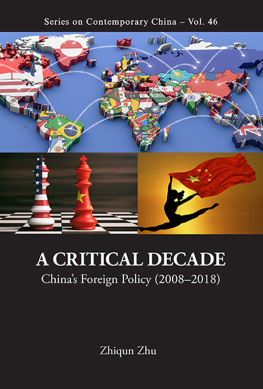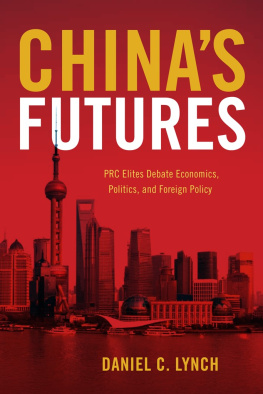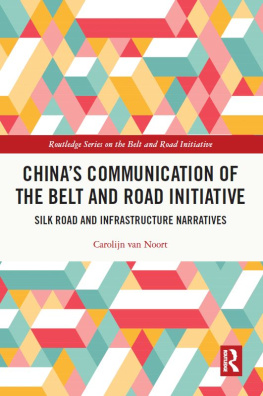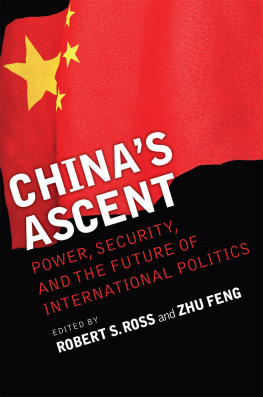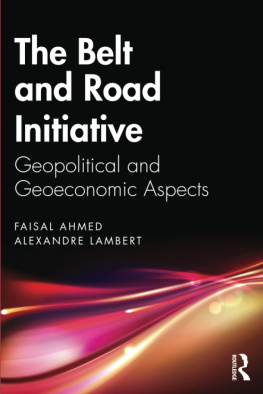
Chinas International Socialization of Political Elites in the Belt and Road Initiative
This book argues that Chinas international socialization of the political elites of Belt and Road Initiative (BRI) partner states is an exceptionally effective instrument of Chinas current foreign policy. It shows how the BRI-related process of socialization generates shared beliefs in the legitimacy and therefore in the acceptability of a Chinese international order among target elites and how in turn the policies and actions of states controlled by these elites tend to become aligned with the norms taught by the Chinese socializer. It goes on to show how this serves the interests of Chinas government, firms, and citizens at national, regional, and global levels; and how the resulting increased support for Beijings version of the international order creates a virtuous circle that further enhances Chinas international position and potential.
Theodor Tudoroiu is a senior lecturer and head of the International Relations Unit of the Department of Political Science of the University of the West Indies, St. Augustine campus, Trinidad and Tobago.
Amanda R. Ramlogan, who co-authored Chapter 5, is a Ph.D. student at the Institute of International Relations and a part-time lecturer at the Department of Political Science of the University of the West Indies, St. Augustine campus, Trinidad and Tobago.
Routledge Contemporary China Series
211Youth Economy, Crisis, and Reinvention in Twenty-First-Century China
Morning Sun in the Tiny Times
Hui Faye Xiao
212The Chinese Economy and its Challenges
Transformation of a Rising Economic Power
Charles C.L. Kwong
213Keywords in Queer Sinophone Studies
Edited by Howard Chiang and Alvin K. Wong
214Macau 20 Years after the Handover
Changes and Challenges under One Country, Two Systems
Edited by Meng U Ieong
215Doing Labor Activism in South China
The Complicity of Uncertainty
Darcy Pan
216Chinese Energy Companies in Africa
Implications for the Foreign Policy of an Authoritarian State
Kasandra Behrndt-Eriksen
217Chinas International Socialization of Political Elites in the Belt and Road Initiative
Theodor Tudoroiu with Amanda R. Ramlogan
218Regional Inequality in Transitional China
Haifeng Liao, Dennis Wei and Li Huang
219Modern Art for a Modern China
Yiyan Wang
For more information about this series, please visit: https://www.routledge.com/Routledge-Contemporary-China-Series/book-series/SE0768
Chinas International Socialization of Political Elites in the Belt and Road Initiative
Theodor Tudoroiu with
Amanda R. Ramlogan
First published 2021
by Routledge
2 Park Square, Milton Park, Abingdon, Oxon OX14 4RN
and by Routledge
52 Vanderbilt Avenue, New York, NY 10017
Routledge is an imprint of the Taylor & Francis Group, an informa business
2021 Theodor Tudoroiu
The right of Theodor Tudoroiu to be identified as author of this work has been asserted by him in accordance with sections 77 and 78 of the Copyright, Designs and Patents Act 1988.
All rights reserved. No part of this book may be reprinted or reproduced or utilised in any form or by any electronic, mechanical, or other means, now known or hereafter invented, including photocopying and recording, or in any information storage or retrieval system, without permission in writing from the publishers.
Trademark notice: Product or corporate names may be trademarks or registered trademarks, and are used only for identification and explanation without intent to infringe.
British Library Cataloguing-in-Publication Data
A catalogue record for this book is available from the British Library
Library of Congress Cataloging-in-Publication Data
A catalog record for this book has been requested
ISBN: 978-0-367-48731-7 (hbk)
ISBN: 978-1-003-04253-2 (ebk)
Typeset in Times New Roman
by Apex CoVantage, LLC
Contents
THEODOR TUDOROIU AND AMANDA R. RAMLOGAN
Guide
I would like to thank Routledge and Peter Sowden, the Editor for Asia, Russia, and Eastern Europe, for supporting this project.
I would also like to thank Amanda Ramlogan who is the co-author of for her valuable contribution to this book, and an anonymous reviewer for their useful suggestions.
I am grateful for the moral support provided by my colleagues in the Department of Political Science at the University of the West Indies, St. Augustine campus.
Finally, I want to express my gratitude for the financial support of the Campus Research and Publication Fund Committee of the University of the West Indies, St. Augustine campus, under Grant CRP.3.NOV16.10, which made possible fieldwork used in .
The Belt and Road Initiative (BRI) may well represent the most important geopolitical and geoeconomic enterprise of our times. Accordingly, its various aspects have been analyzed by a large and growing corpus of scholarly works. However, a key topic at the heart of the Chinese construct remains severely undertheorized: the role of the political elites of partner states, which is instrumental in explaining the impressive expansion of the Initiative. Using International Relations (IR) Constructivism and six case studies, this book argues that the international socialization of these elites by normative power China represents the central element of the BRI. Moreover, Beijings efforts to develop normative power, as well as the use of this power in the socialization process, is part of a strategy intended to bring Global South state-society complexes within an extensive network of close partnerships conducive to the creation of a new, Chinese-centered international order. In the process, significant political and economic benefits are obtained by the Chinese state, companies, and citizens. Yet, Beijings offensive is firstly normative and only secondly geopolitical and geoeconomic. In particular, it replaces the classical use of spheres of influence and security-based counter-hegemonic actions with an original approach based on the concept of relationality, i.e. on the belief that cooperation is better served by the level of intimacy and importance placed in the relationship than by overtly stated self-interest calculations (Qin 2016, 2018; Summers 2019: 210; Demir 2017: 98). To socialize political elites in BRI partner states, an elaborate set of norms is used that brings together the harmonious Five Principles, which ensure legitimacy and build confidence; a general norm related to the beneficial nature of the relationship with China; and three highly self-interested political, economic, and social normative subsets. The first can be summarized as no Taiwan, no Tibet, no Tiananmen Square. The second protects the activity of Chinese firms and promotes a business pattern that replaces traditional bidding processes with government-to-government agreements. The third prevents partner governments from regulating the inflow or economic activities of Chinese entrepreneurial migrants. These norms influence the national policies of BRI partner states in important fields such as diplomacy, the respect of human rights abroad, development assistance, foreign debt, inward investment, infrastructure, trade, labor, immigration, and governance. While very beneficial to Chinas interests, the acceptance of its norms may have severe negative socio-economic consequences for important local social groups. This frequently results in frustration and various forms of protest. However, compliance is ensured due to the socialization of political elites, which changes their cognitive and normative beliefs and understandings, making them redefine their states national interest. The Chinese socialization has been very successful in the BRI countries due to the use of a skillfully customized mix of persuasion and material incentives; in almost all cases, the latter prominently include prestige infrastructure projects used to increase the political legitimacy and electoral support of targeted elites. It should be noted that only the elites in power are concerned. They have much to gain, and tend to cooperate; rapid socialization ensues, even if this process normally does not go beyond rather superficial Type I role playing. The problem is that, in order to reduce costs, Beijing does not socialize the political opposition or the society at large. When government or regime change brings new political groups to power, the socialization process needs to be repeated. This may be an issue when important social groups are negatively impacted by the effects of Chinas economic and social norms and become hostile to the Chinese presence. An elites-society gap can develop, whose effects may limit or even reverse the socialization of the elites. Yet, each setback is followed by Beijings renewed socialization efforts. They are in general successful; significant obstacles are nevertheless represented by voluntaristic leaders, by structural incompatibilities between the BRI features and the target country, and especially by geopolitical factors, i.e. by the actions of rival regional or global powers. Accordingly, the arrangement of soft balancing (Lairson 2018: 4849) currently orchestrated by the United States and other Western and Asian states may seriously threaten Chinas socialization process. This would significantly diminish the influence of the Belt and Road Initiative and implicitly reduce Beijings chances of constructing a new Chinese-centered international order. For the time being, however, the BRI remains a highly successful socialization-based enterprise.


